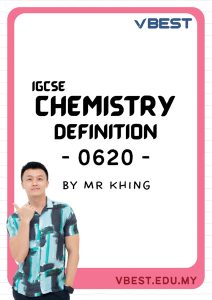Academic Director
IGCSE BIOLOGY, IGCSE CHEMISTRY
More than 6 years teaching experience. Provide concise and compact notes designed uniquely for students to score exams
IGCSE CHEMISTRY
More than 11 years of teaching experience. Motivating teacher with outstanding academic records.
IGCSE CHEMISTRY, IGCSE MATHEMATICS
More than 9 years of teaching experience. Coaching student with an interactive information.
IGCSE BIOLOGY, IGCSE CHEMISTRY
More than 6 years of teaching experience. Has interactive teaching style to make sure the students enjoy the class.
IGCSE Chemistry Tutors
IGCSE BIOLOGY, IGCSE CHEMISTRY, IGCSE MATHEMATICS, IGCSE PHYSICS
More than 5 years of teaching experience. Full of passion, fun and energetic.
IGCSE ADD MATHS, IGCSE CHEMISTRY, IGCSE PHYSICS
More than 5 years of teaching experience. Having genuine, practical, inspiring teaching style.
IGCSE BIOLOGY, IGCSE CHEMISTRY
More than 5 years of teaching experience. Techniques to tackle past year questions.
A* Notes
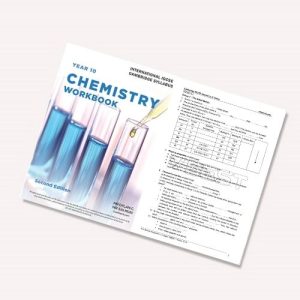

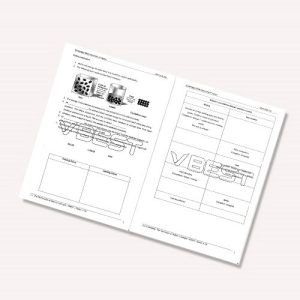
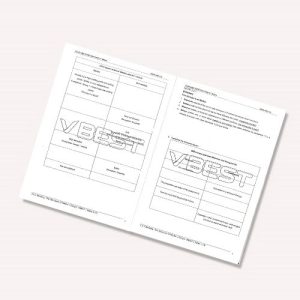
Moments




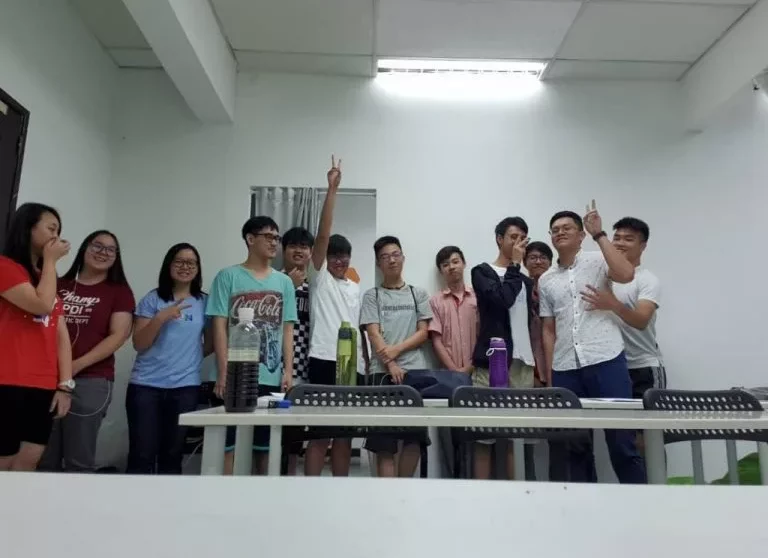











5 ⭐ Reviews












IGCSE Exam Format
| Items | Chemistry |
|---|---|
| Subjects | 0620 |
| Numbers of Papers | THREE Exam Papers Paper 2 Paper 4 Paper 6 |
| Exam Duration & Marks | Paper 2 45 minutes (40 marks) Paper 4 1 hour 15 minutes (80 marks) Paper 6 1 hour (40 marks) |
| Weighting of Papers | Paper 2 - 30% Paper 4 - 50% Paper 6 - 20% |
IGCSE Thresholds
| maximum raw mark available | A | B | C | D | E | F | G | |
|---|---|---|---|---|---|---|---|---|
| Component 11 | 40 | - | - | 19 | 17 | 15 | 13 | 11 |
| Component 12 | 40 | - | - | 20 | 17 | 15 | 13 | 11 |
| Component 13 | 40 | - | - | 20 | 17 | 15 | 13 | 11 |
| Component 21 | 40 | 26 | 22 | 18 | 16 | 14 | 12 | 10 |
| Component 22 | 40 | 27 | 21 | 16 | 14 | 13 | 12 | 11 |
| Component 23 | 40 | 26 | 21 | 16 | 15 | 14 | 13 | 12 |
| Component 31 | 80 | - | - | 38 | 30 | 22 | 14 | 6 |
| Component 32 | 80 | - | - | 39 | 32 | 25 | 17 | 9 |
| Component 33 | 80 | - | - | 38 | 31 | 23 | 15 | 7 |
| Component 41 | 80 | 42 | 30 | 19 | 15 | 11 | 8 | 5 |
| Component 42 | 80 | 40 | 30 | 19 | 15 | 11 | 8 | 5 |
| Component 43 | 80 | 40 | 30 | 20 | 16 | 12 | 9 | 6 |
| Component 51 | 40 | 24 | 20 | 16 | 13 | 11 | 9 | 7 |
| Component 52 | 40 | 25 | 20 | 15 | 13 | 11 | 8 | 5 |
| Component 53 | 40 | 25 | 19 | 14 | 12 | 10 | 8 | 6 |
| Component 61 | 40 | 25 | 21 | 16 | 14 | 12 | 10 | 8 |
| Component 62 | 40 | 27 | 22 | 16 | 14 | 11 | 8 | 5 |
| Component 63 | 40 | 26 | 20 | 15 | 14 | 12 | 10 | 8 |
IGCSE Grading System
| Cambridge IGCSE Letter Grade | Percentage Uniform Mark Range |
|---|---|
| A* | 90 - 100 |
| A | 80 - 89 |
| B | 70 - 79 |
| C | 60 - 69 |
| D | 50 - 59 |
| E | 40 - 49 |
| U | <40 or unsat |
IGCSE Chemistry Exam Syllabus
| Chapter | Topics |
|---|---|
| Chapter 1 | States of matter 1.1 Solids, liquids and gases 1.2 Diffusion |
| Chapter 2 | Atoms, elements and compounds 2.1 Elements, compounds and mixtures 2.2 Atomic structure and the Periodic Table 2.3 Isotopes 2.4 Ions and ionic bonds 2.5 Simple molecules and covalent bonds 2.6 Giant covalent structures 2.7 Metallic bonding |
| Chapter 3 | Stoichiometry 3.1 Formulae 3.2 Relative masses of atoms and molecules 3.3 The mole and the Avogadro constant |
| Chapter 4 | Electrochemistry 4.1 Electrolysis 4.2 Hydrogen–oxygen fuel cells |
| Chapter 5 | Chemical energetics 5.1 Exothermic and endothermic reactions |
| Chapter 6 | Chemical reactions 6.1 Physical and chemical changes 6.2 Rate of reaction 6.3 Reversible reactions and equilibrium 6.4 Redox |
| Chapter 7 | Acids, bases and salts 7.1 The characteristic properties of acids and bases 7.2 Oxides 7.3 Preparation of salts |
| Chapter 8 | The Periodic Table 8.1 Arrangement of elements 8.2 Group I properties 8.3 Group VII properties 8.4 Transition elements 8.5 Noble gases |
| Chapter 9 | Metals 9.1 Properties of metals 9.2 Uses of metals 9.3 Alloys and their properties 9.4 Reactivity series 9.5 Corrosion of metals 9.6 Extraction of metals |
| Chapter 10 | Chemistry of the environment 10.1 Water 10.2 Fertilisers 10.3 Air quality and climate |
| Chapter 11 | Organic chemistry 11.1 Formulae, functional groups and terminology 11.2 Naming organic compounds 11.3 Fuels 11.4 Alkanes 11.5 Alkenes 11.6 Alcohols 11.7 Carboxylic acids 11.8 Polymers |
| Chapter 12 | Experimental techniques and chemical analysis 12.1 Experimental design 12.2 Acid–base titrations 12.3 Chromatography 12.4 Separation and purification 12.5 Identification of ions and gases |
IGCSE Exam Sample Papers
| IGCSE Sample Papers |
|---|
| IGCSE Sample Papers 1 |
| IGCSE Sample Papers 2 |
| IGCSE Sample Papers 3 |
| IGCSE Sample Papers 4 |
IGCSE Notes
| IGCSE Notes |
|---|
| IGCSE Notes 1 |
| IGCSE Notes 2 |
| IGCSE Notes 3 |
| IGCSE Notes 4 |
Definition Lists
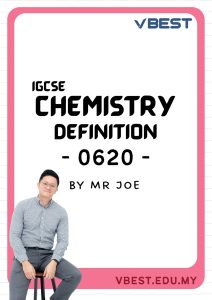
IGCSE Chemistry by Mr Joe (coming soon)
Frequently Asked Questions about IGCSE Chemistry
Is chemistry difficult?
With the help of our tutors and their specially designed techniques, chemistry will be a fun and easy subject.
How experienced are your IGCSE Chemistry Tutors?
Our tutors have a minimum of 4 years in teaching IGCSE Chemistry with more than 10000 teaching hours.
How Long is the Duration for Each Online IGCSE Lesson?
Each lesson will take from 60 to 90 minutes depending on the students' capability.
Do you provide online IGCSE Chemistry tuition?
Yes we do. Do WhatsApp us or call us for more information.
How is the online igcse tuition conducted?
Our teachers conducted lesson through Zoom and carefully structured notes are share.
What is Chemistry equivalent to?
Equivalent to SPM chemistry.








